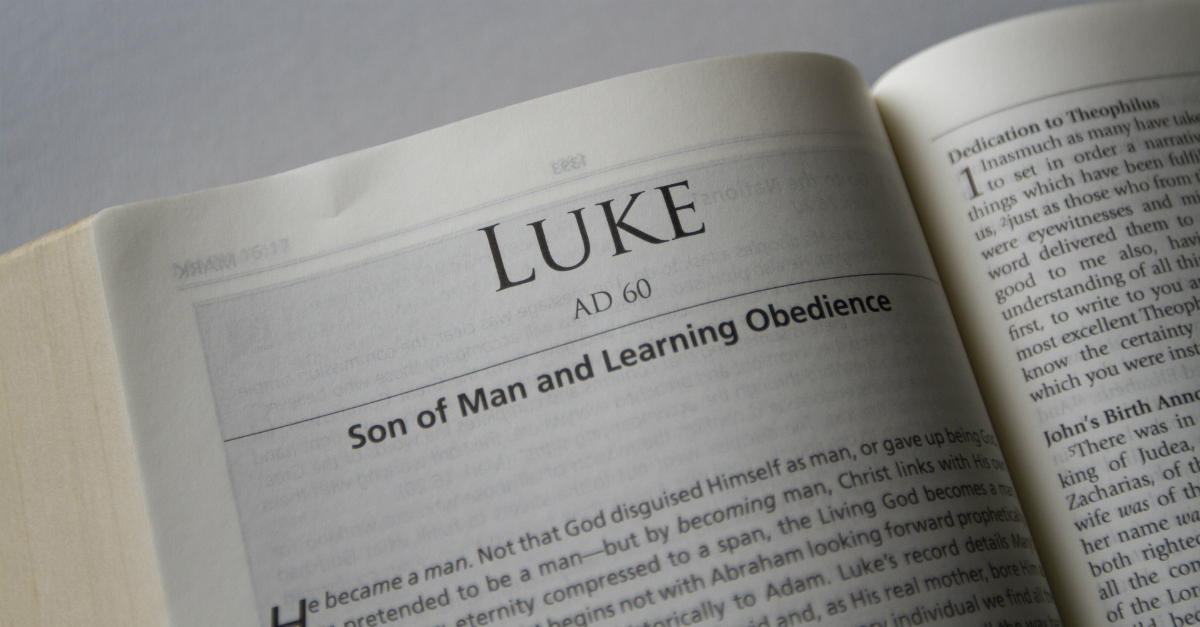Luke Healy Lakeview - The Gospel Storyteller
When we consider stories that truly shape our view of the world, there are certain accounts that stand out, offering a unique perspective, much like a peaceful lakeview. It's interesting, how some writings, quite like the work connected to Luke, bring a sense of wholeness, a kind of "healy" touch, to the human experience. This is what we find when we think about the writings attributed to Luke, a storyteller whose message still resonates with so many people, even today.
Many people had already started to put together their own records of the things that were truly, firmly accepted among the early followers, just as those who saw it all happen from the very start passed them along to us. This effort to record what went on, to put it in a clear, sensible order, is a significant part of what makes Luke's contribution so special, so it's almost a way of looking at faith with a fresh set of eyes, a new outlook.
This particular writing, often called the Gospel of Luke, is the third such account you'll find in the New Testament's typical listing. It tells about the beginnings, the birth, the time Jesus spent teaching and helping others, his death, his coming back to life, and his going up to heaven. It gives us a very particular view, a kind of "lakeview" into these events, making them feel quite close and personal, you know.
Table of Contents
- Who Was Luke, The Author of This Lakeview?
- What Did Luke Want Us to Know About Jesus?
- How Did Luke Put His Account Together?
- Why Does Luke's Writing Still Matter Today?
Who Was Luke, The Author of This Lakeview?
The person behind this important book, Luke, holds a place as one of the four main writers of the gospel accounts. People have long said that he wrote both the Gospel of Luke and the Book of Acts, which tells what happened after Jesus went back to heaven. It's quite something, to have two such significant works tied to one person, you know.
Interestingly, Luke does not actually put his own name in either of the books he wrote. You won't find him saying "I, Luke, wrote this." But, as a matter of fact, Paul, a very well-known figure in early Christian times, mentions Luke by name in three of his letters. This gives us a little clue about who he was and his connections, so it's a small but important piece of information.
He was quite skilled in using the Greek language, which you can see in the way he put his thoughts on paper. His particular way of looking at things and his general feelings, for instance, how he talked about "the barbarians" in Acts 28:2 and 4, show that he was indeed a Greek person. This background likely gave him a particular viewpoint, a kind of cultural lens through which he saw and presented his material, which is pretty interesting.
A Glimpse at Luke's Background
Luke had a clear approach to what he would include in his writings. He wasn't going to spend time on things where Christians might have different thoughts or feel unsure about. Instead, he chose to focus on matters that were truly, truly believed, things that people ought to hold as certain. This shows a very deliberate choice in what kind of story he wanted to tell, a very focused approach, really.
Here's a quick look at some details we gather about Luke, the writer, from the historical accounts linked to him:
| Detail | Information (from "My text") |
|---|---|
| Role | Evangelist, Gospel Author |
| Works Attributed | Gospel of Luke, Book of Acts |
| Self-Identification | Not named in his books |
| Mentions by Others | Paul mentions him in three letters |
| Linguistic Skill | Skilled in Greek |
| Background (Implied) | Greek |
| Core Focus | Things surely believed, care for the poor, outcast, afflicted |
What Did Luke Want Us to Know About Jesus?
The account from Luke, often called the Gospel of Luke, is the third of the New Testament's four official gospel books. It tells the story of Jesus from his very beginnings, his birth, the time he spent helping and teaching people, his death, his coming back to life, and his return to heaven. It's a comprehensive telling, giving us a full picture of these significant events, you know.
Throughout this entire gospel, Luke gently asks anyone who follows Christian teachings to see themselves in the way Jesus lived. Jesus is shown as someone who truly cares for and is kind to those who are poor and humble, those who are left out, people who have made mistakes, and those who are suffering. This particular focus really sets Luke's story apart, painting a picture of deep compassion, which is quite touching.
He shares some very direct instructions from Jesus, like in Luke 6:27, where Jesus says, "But I say to you who hear, Love your enemies, do good to those who hate you." And then, in the very next verse, Luke 6:28, he adds, "Bless those who curse you, and pray for those who spitefully use you." These are pretty strong words, asking for a truly different way of living, a rather challenging one, in some respects.
Luke also shares a story Jesus told, like the one in Luke 18, about a widow who just kept asking a judge for what was right, and she wouldn't give up. Jesus told this story to teach people that they should always pray and not lose heart. It's a powerful lesson about persistence and hope, showing us how much it matters to keep going, even when things are tough, you know.
The Heart of Luke's Story
Luke makes it clear that while we are told not to judge others, as in Luke 6:37, this isn't about stopping us from using good, sensible thought. It's not a command to ignore wisdom that comes from God, or common sense, or the courage to do what is right, along with what God has written down, to figure out what is truly good and what is not. It's about how we go about it, basically, with a gentle spirit.
For example, in Luke 7:41, he mentions a "denarius," which was typically the amount a day laborer would earn for a day's work. These small details help us understand the everyday lives of people back then, giving the stories a very real feel, a bit like looking through a window into another time.
How Did Luke Put His Account Together?
Many people had already decided to write down a clear telling of the things that were truly believed among them, just as those who saw it all from the beginning and passed it on to them. Luke saw this effort and decided to add his own, carefully put together account. It shows a desire to make sure the story was told accurately and completely, which is quite admirable, really.
Luke's gospel is the third account of the life of Jesus Christ, according to how the books are usually listed in the New Testament. This means it follows Matthew and Mark, offering its own distinct viewpoint and details, which is quite helpful for getting a full picture.
We see small but important moments, like in Luke 6:1, where it talks about Jesus going through the corn fields "on the second sabbath after the first." This kind of specific detail shows Luke's attention to the timing of events. His followers were picking and eating the ears of corn, rubbing them in their hands, which gives a very human touch to the scene, you know.
And there's a reference in Luke 6:29 to a "Greek chiton," which was a long piece of clothing worn under a cloak, close to the skin. These sorts of specific words show his knowledge of the culture and everyday items of the time, making the narrative feel very grounded and real, so it's almost like you are there.
Crafting the Narrative
Luke also mentions important historical events, like the first census that took place when Quirinius was the governor. This detail helps to place the story of Jesus's birth within a real historical setting, making it feel less like a myth and more like something that truly happened in a specific time and place, which is quite important for many readers.
The way Luke puts his account together is very deliberate. He wants to present things in a clear order, a declaration of those matters that are most surely believed among the community. This was handed down by those who were eyewitnesses from the very start. It speaks to a commitment to historical accuracy and reliable sources, which is a significant part of his writing style.
The early church leaders gave him credit for writing both the Gospel of Luke and the Book of Acts. This tradition has carried on through the centuries, showing a long-standing acceptance of his role in putting these foundational stories into written form, which is quite a legacy, isn't it?
Why Does Luke's Writing Still Matter Today?
Luke's writings offer a unique lens, a kind of "lakeview," into the early days of Christianity and the life of Jesus. His careful gathering of information, from those who saw things firsthand, means that what he wrote was based on what was truly accepted as fact among the first followers. This makes his account a valuable resource for anyone wanting to learn about these events, you know.
The book of Luke can be read online, with chapters and verses, and often comes with summaries, comments, and ways to find related ideas for deeper study. This accessibility means that its message can reach many people, allowing them to connect with the stories and teachings in a way that feels personal and meaningful, which is pretty wonderful.
Luke's particular focus on Jesus's care for the poor, the humble, those who were left out, people who had made mistakes, and those who were hurting, is a central part of his message. This emphasis means that his gospel speaks to the idea of compassion and kindness for everyone, especially those who might need it most. It's a very "healy" aspect of his writing, you could say, offering comfort and acceptance.
A Timeless Message for Luke Healy Lakeview
The teachings about loving your enemies, doing good to those who dislike you, and praying for those who treat you badly, as found in Luke, are timeless instructions. They challenge people to live in a way that goes beyond typical human reactions, encouraging a spirit of forgiveness and generosity. These are powerful ideas that can change how we see the world, so they are quite important.
The reminder to pray at all times and not lose heart, as Jesus taught in the parable of the persistent widow, is a message that still holds true. It encourages a steadfast spirit, a belief that keeping at it, even in prayer, can bring about good things. This sense of enduring hope is a significant part of what Luke wanted to convey, offering a comforting thought to anyone facing difficulties.
Luke's work, which includes the Gospel and the Book of Acts, serves as a foundation for understanding the beginnings of the Christian faith. His detailed accounts and specific focus on certain themes give readers a clear picture of Jesus's life and the spread of his message. It's a very important historical and spiritual document, truly, that continues to inform and inspire people across generations.
The entire collection of writings attributed to Luke helps us to grasp the things that were most surely believed by the early community. It's a record, carefully put together, of events that were passed down by those who witnessed them from the very start. This dedication to recording what was known and accepted makes Luke's contribution something truly special and lasting, a kind of enduring perspective, like a calm lakeview.

Book of Luke Summary | Christianity.com

Luke Skywalker | Lukepedia | FANDOM powered by Wikia

Luke - Lesson 24A | Verse By Verse Ministry International